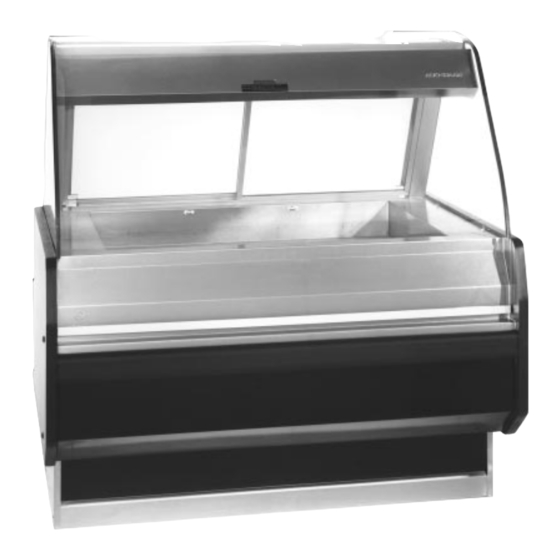Alto-Shaam Halo Heat HNSYS-48 Manuale d'uso e manutenzione - Pagina 3
Sfoglia online o scarica il pdf Manuale d'uso e manutenzione per Attrezzature per alimenti commerciali Alto-Shaam Halo Heat HNSYS-48. Alto-Shaam Halo Heat HNSYS-48 19. Heated display case

If placing into solid foods such as meat roast or poultry
breasts, push the probe in from a straight downward
position or in from the side to the center position. If
placing into a semi-liquid or liquid product, the probe
cable will probably need to be secured to keep the probe
positioned properly. Do not let the probe tip touch the
edges or side of the container. Tape the probe cable to
the lip or edge of the container. Wipe each probe tip with
a clean paper towel to remove food debris after each use.
Follow by wiping probes with a disposable alcohol pad.
Return each probe to the proper bracket position.
7. SERVE FRESH HOT DELI FOOD
Keep hot deli foods looking fresh. Occasionally stir or
rotate foods as needed. Serve products in the proper
package or container. Keep display case doors closed
after serving. Wipe spills immediately to assure
maximum eye appeal and ease end of the day cleanup
C A R E a n d C L E A N I N G
The cleanliness and appearance of this
unit will contribute considerably to operating
efficiency and savory, appetizing food.
Good equipment that is kept clean works
better and lasts longer.
1. CLEAN THE PROBES DAILY
Remove all food soil from probes. Wipe entire probe and
cable assembly with warm detergent solution and a clean
cloth. Remove detergent by wiping each probe and cable
with clean rinse water and a cloth. Wipe probes with
disposable alcohol pad or sanitizing solution recommend-
ed for food contact surfaces. Allow probe and cable to air
dry in probe holding bracket.
2. THOROUGHLY CLEAN THE UNIT DAILY
A. Turn lights and adjustable thermostat(s) to the "OFF"
position, and disconnect unit from power source.
B. Remove, cover or wrap, and store unused products
under refrigeration.
C. Clean the interior metal surfaces of the cabinet with
a damp cloth and any good alkaline or alkaline
chlorinated based commercial detergent or grease
solvent at the recommended strength.
Use a plastic scouring pad or oven
cleaner for difficult areas. Avoid the use
of abrasive cleaning compounds, chloride
based cleaners, or cleaners containing
quaternary salts. Rinse well to remove
all residue and wipe dry.
NOTE: Never use hydrochloric acid (muriatic
acid) on stainless steel.
D. Clean the glass with a window cleaner.
E. To help maintain the protective film coating on
polished stainless steel, clean the exterior of the unit
with a cleaner recommended for stainless steel
surfaces. Spray the cleaning agent on a clean cloth and
wipe with the grain of the stainless steel.
Always follow appropriate state or local health (hygiene)
regulations regarding all applicable cleaning and sanitation
requirements for equipment.
recommended replacement. These bulbs have
been treated to resist breakage and
must be replaced with similarly
treated bulbs in order to maintain
compliance with NSF standards.
!
C A U T I O N
e nv i r o n m e n t a l c o n d i t i o n s o r a g i n g .
Operators should be aware of any decrease in effort to lift
the hood and initiate an immediate gas strut safety check.
D O N OT L I F T T H E H O O D I N T H I S C O N D I T I O N .
#894 Operation & Care Manual •
S
At no time should the inside
or outside of the cabinet be
washed down, flooded with
water or liquid solution.
Do not use water jet to clean.
NEVER STEAM CLEAN.
Severe damage or electrical
hazard could result,
voiding the warranty.
Disconnect Unit from
Power Source Before
Cleaning or Servicing.
SAFETY ALERT
This units performance has been
optimized using the factory provided
bulbs. These bulbs should be
replaced with an exact
replacement or with a factory
H o o d g l a s s ex t e n d e d t o t h e f u l l u p r i g h t
p o s i t i o n i s s t a b i l i z e d t h r o u g h t h e u s e
o f g a s s t r u t s d e s i g n e d f o r t h e f u l l
l o a d b e a r i n g w e i g h t .
c o u l d w e a k e n o r f a i l d u e t o w e a r,
2.
T h e s e s t r u t s
